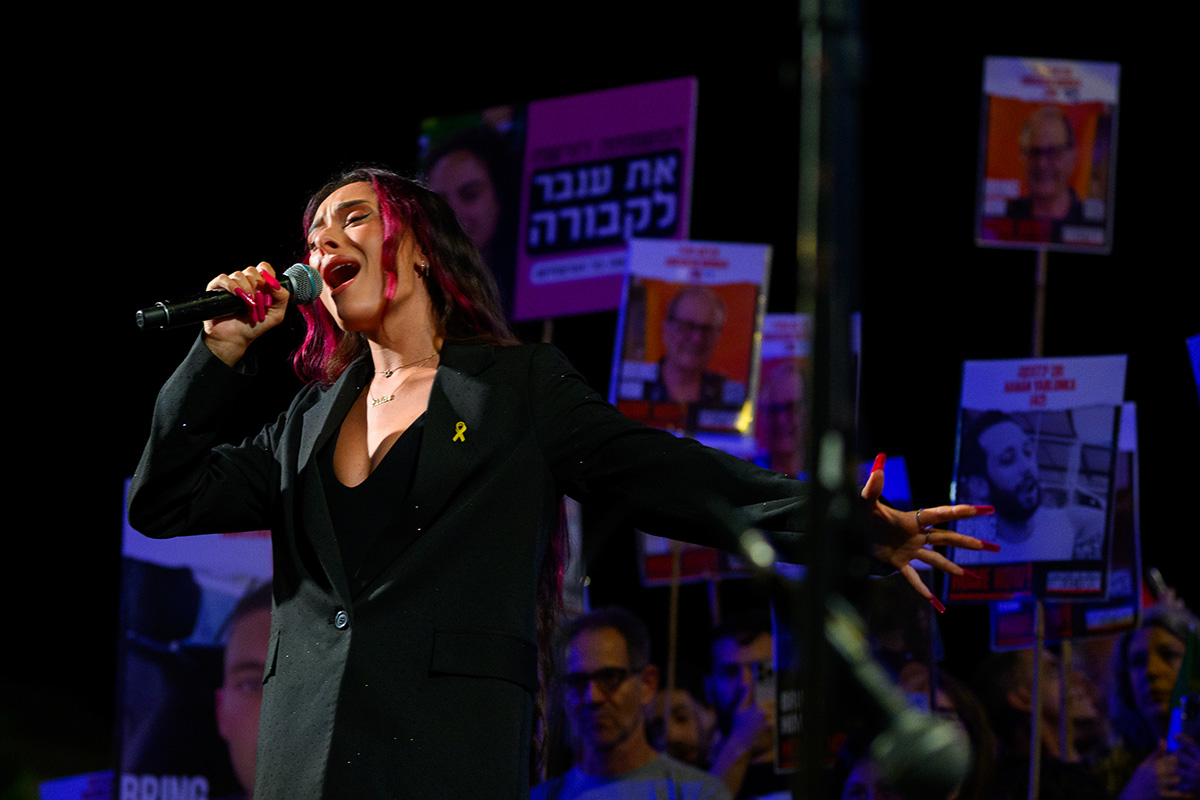“Hurricane,” Israel’s Eurovision entry this year which came in 5th place despite a fraught competition, had to be rewritten multiple times to take out any political messaging. The song, co-written by Keren Peles, Ori Ohayon and Stav Beger, was originally called “October Rain,” and had what were some pretty obvious references to Hamas’ October 7th attack on Israel and its aftermath.
Since the Eurovision is meant to be an apolitical international event, 20-year-old singer Eden Golan and the Israeli Eurovision delegation were forbidden from making any political statements — including donning hostage tags and wearing yellow — and the experience for everyone participating in the show in Malmö was complicated, with booing, jeering and social ostracization on and off stage and angry protests outside the venue decrying Israel’s participation in light of the Israel-Hamas War.
But a week after the Eurovision final, Golan took the stage at the Hostages Square in Tel Aviv, a place where families have been gathering to protest in front of the Tel Aviv Museum of Art, to sing the original version of the song, which is a cry of solidarity with the pain of the hostages and their loved ones and an urgent plea for their return. Instead of wearing her off-white designer gown made by Alon Livneh, which evoked imagery from burial shrouds, Golan wore a black suit with a yellow ribbon pin that calls for the return of the hostages. Behind her, families gathered with signs featuring the pictures of their loved ones who are among the roughly 130 hostages still being held in Gaza.
Instead of singing the line from “Hurricane” that goes, “Writer of my symphony / Play with me,” Golan sang, “Writer of history/stand with me” — an ask of solidarity from the world. “Hours and hours, empowers / Life is no game, but it’s ours” was originally, “Hours and hours and flowers / Life is no game for the cowards,” with the word flowers there as a reference to the fallen.
In the rousing chorus, “Take it all and leave the world behind / Baby, promise me you’ll hold me again / I’m still broken from this hurricane” was first written as, “Take me home and leave the world behind / And I promise you that never again / I’m still wet from this October rain.”
Yet perhaps the most arresting lyric is the final part of the song, softly uttered in Hebrew, that got angry boos at the end of Golan’s performance at the Eurovision: “I don’t need any big words / Just prayers / Even if it’s hard to see / You always leave me one small light” is what she sang for the contest, but on stage in Tel Aviv, Golan sang, “We don’t have air left to breath / No space / There’s no me from day to day / They were all good kids, each and every one,” a line clearly referring to both the victims of the attack, and the hostages and their lived experience.
While Golan’s song on the stage at the Eurovision was powerful and resilient, during her performance on the stage in Tel Aviv, surrounded with people who love her and what she represents — and who were all reverently quiet as she sang — Golan seemed more moved than ever. And the cheers she received at the end of the song were heartfelt.
“This is my first time performing after Eurovision and it’s important for me to sing this song with these words on this stage at this square. I will continue to use my voice on and off the stage until every one of them is safely back home,” she shared on Instagram








